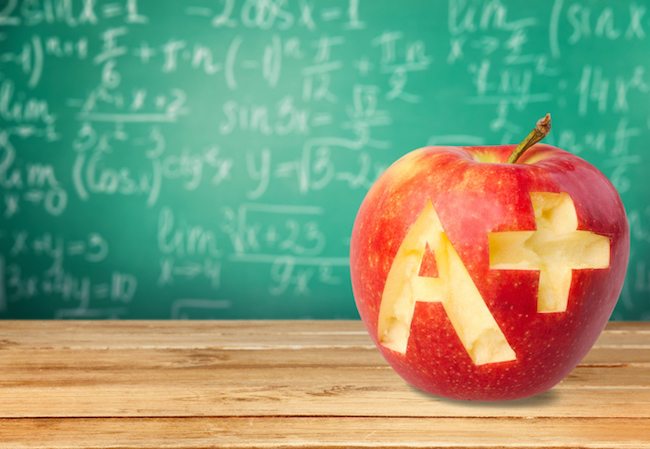6) Average SAT Scores At The Top Undergraduate Business Programs
Once a high school student selects his or her target colleges, the next big question is, “Can I get in?” While transcripts of your high school grades are critical, the most common element of an undergraduate application is your standardized test score. So there’s little wonder that our exclusive list of average SATs across the top business schools was so well read.
For one thing, these numbers are hard to come by. Most average SAT scores are university-wide and not school specific. We were able to come up with these numbers by surveying the schools and asking for the information as part of the data set for our new ranking of the best undergraduate business schools.
What did we find? Washington University’s Olin Business School in St. Louis boasts the highest average score at 1480 (out of the 1600 scale, including critical reading and math sections). Olin, which finished first in the overall ranking, was followed by the University of Notre Dame’s Mendoza College of Business, which notched an average of 1460. The University of Pennsylvania’s Wharton School had the next highest average at 1457. Mendoza and Wharton finished second and third, respectively, in the overall rankings.
Of the 10 schools with the highest average SAT for its entering class of 2016, seven were also in the top 10 of Poets&Quants’ ranking. Every top 15 school in the overall rankings —with the exception of the University of Minnesota’s Carlson School of Management — had an SAT average in the top 20 of the 50 schools to be ranked. Indeed, for the vast majority, the road to an elite undergraduate business education still requires a stellar SAT score.
7) Why Supply Chain Management Has Become A Hot Major At Business Schools
Most undergraduate students enter business school barely even knowing what supply chain management is, instead setting their sights on more comfortable and well-trodden paths like finance or accounting. That is starting to change as supply chain management, a once sleepy subject that used to be the sole domain of MBA students and master’s programs, is becoming a popular, sought-after major on undergraduate campuses.
There are now at least 150 undergraduate business schools that offer bachelor’s degrees either in supply chain management or with a concentration in the area, according to a 2014 report from the Institute for Supply Management, a Tempe, Arizona-based industry group. In the last 15 years or so there has been an explosion of college programs in the subject, said Ashley Anne Peightal, a senior research associate at the Institute for Supply Management. “About 20 years ago, companies on both the non-manufacturing and manufacturing side realized how valuable supply chain management is because of the need for globalization and other factors,” she said. “Supply chains became inherently more complicated for this reason and obtaining formal training has become more and more important, and the positions, well paid.”
There’s a simple reason behind the growth: Supply chain undergraduate placement rates are between 85% to 100% and, in many cases, graduates are accepting higher starting salaries than finance and accounting majors. The average starting salary for undergraduates is $53,584, and top students are commanding premiums $25,000 or more beyond this.
8) 2016 Rankings Report Card: How Alums Grade Their Schools
A core part of our undergraduate rankings was our survey to graduates who have been out of school for two years. We asked alumni a series of questions that get to the heart of a solid undergraduate experience.
The survey revealed that, at least among these leading business schools, satisfaction is extraordinarily high. While some schools obviously did better than others, in most cases the differences weren’t all that great. The gap between the highest scorer and the lowest scorer on any one of our dozen core satisfaction questions was not extraordinarily high. On a 10-point scale, with 10 reflecting the most positive response possible, the difference could be roughly three points from top to bottom. That is a significant difference, but it still reflects a level of high satisfaction with schools. In one case, alumni could be described as enthusiastically positive. In another, merely positive. In no way were any of the scores truly damning.
Of all the questions we asked alumni about their schools, the most valuable might well be this one: Would you recommend the business program to a close friend? After all, if an alum feels completely satisfied about their undergraduate experience, the ultimate expression of their approval would be to recommend the program to someone they care about and love. What were the schools that got the most unqualified endorsements and therefore the best grades on this metric?
The top five, in order, are Indiana University’s Kelley School of Business, the University of Texas’ McCombs School of Business, University of Notre Dame Mendoza College of Business, James Madison University’s College of Business, and the University of Massachusetts-Amherst (Isenberg School of Management). On our ten-point scale, all the undergraduate programs scored exceptionally high on this question, between 9.81 and 8.88, with an average score of 9.46. In other words, all of the schools come highly recommended by their alums.














Questions about this article? Email us or leave a comment below.